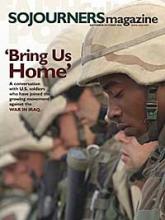A ship’s hull that holds together when the great storms roll through is said to have integrity. In the life of faith, integrity means living out of consistent moral and ethical principles as integralparts of a greater whole. In the end, that greater whole is the rule of God in history. The body of Christ, the church, is only as healthy and world-changing as its integrity allows.
Patiently heeding the voice of God in the whirlwind, a world-weary Job manifests integrity. Experiencing bouts of despair as his troubles mount, Job still evinces a sturdy trust. It is the kind of reliance on God that the letter to the Hebrews wishes to rouse in sleepy-eyed Christians who need to be prodded into a more vital, integrated reliance on God.
In this month’s readings, we explore a faith that is communal, childlike, and willing to challenge blindness and complacency. The psalmist remarks on one possible destination: “But as for me, I walk in my integrity; redeem me, and be gracious to me” (Psalm 26:11).
Robert Roth is a writer and social activist in East Lansing, Michigan.
October 1
In Community
Esther 7:1-6, 9-10; 9:20-22; Psalm 124; James 5:13-20; Mark 9:38-50
These passages envision coherent communities of faith in which the lives and challenges of believers are integrated into the vision and purposes of the community. Esther appeals to the Persian king that both “my life be given me” and “the lives of my people.” The psalmist sings about how “our help is in the name of the Lord,” while James 5 calls the early church to communal prayer, praises, and healing as effective responses to suffering or good fortune.
Read the Full Article
